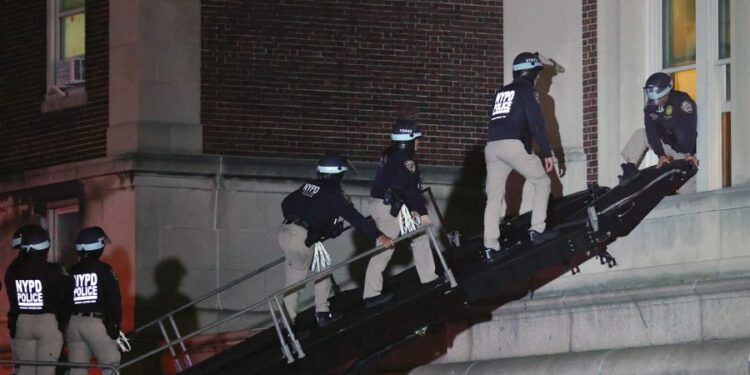
Universities and state education policies dominated in 2024 with a tumultuous year that saw massive protests over the Israel-Hamas war and lawsuits over the separation of church and state in public schools.
The federal level wasn’t completely left out with its own fiasco over the 2024-25 Free Application for Federal Student Aid (FAFSA) form and failures in implementing some student debt relief options.
Here are the top five education stories from 2024.
Campus protests
Universities had an overwhelming spring as thousands of students set up encampments at dozens of schools around the country to protest the Israel-Hamas war.
Protesters pitched tents and demanded their colleges divest from companies that had any involvement with Israel.
The demonstrations led to the cancellation of some commencements, and more than 2,000 individuals were arrested.
At Columbia University, former President Minouche Shafik stepped down months after students at the school began the Israel-Hamas protests and took over an academic building.
The outcomes from the protests varied from school to school, with many deciding their university will no longer comment on controversial issues.
When Harvard announced its decision to stay away from tough political stances, its committee said that when a school stakes its position it can make it “more difficult for some members of the community to express their views when they differ from the university’s official position.”
The Bible in public schools
A new battlefront appeared in public schools in 2024 with multiple lawsuits ensuing over the separation of church and state.
Louisiana, Texas and Oklahoma have all made efforts to include the Bible or Ten Commandments in public school classrooms.
Louisiana is in a legal fight after the governor signed a law earlier this year to have a poster of the Ten Commandments in all public school classrooms.
Oklahoma is aiming for a Bible in every classroom and for teachers to incorporate Bible lessons into their curriculum. The state was sued for these measures.
Texas is giving an optional curriculum, with the incentive of extra funding, to schools that teach kindergarteners through fifth graders about stories in the Bible. A lawsuit is not yet underway over the curriculum.
“The radical leftist mob has tried to rewrite history in Oklahoma,” state Superintendent of Public Instruction Ryan Walters said when the guidelines were released.
“It stops today, and Oklahoma schools will refocus our kids’ education so they know the value of the Bible in its historical context. The woke radicals will not like it. They will not believe it. However, they will teach it in Oklahoma,” he added.
Students stay behind learning curve from pandemic
Educators and schools are struggling as students remain behind from the COVID-19 pandemic three years from when most schools reopened.
Over the summer, research group NWEA released data showing eighth grade students are still a full year behind in both reading and math.
The Center on Reinventing Public Education found the average student is “less than halfway to a full academic recovery.”
Additionally, emergency funding given to schools during the pandemic expired this fall, which was used to give extra tutoring and support personnel to schools.
“I’m not totally optimistic we’re going to see additional funding from Congress, but I do really, really believe it is necessary,” Lindsay Dworkin, senior vice president of policy and government affairs at NWEA, told The Hill.
“I think when the pandemic began, when the funding was first approved, it was absolutely not clear how much disruption there would be and what would happen to student learning,” she added.
FAFSA fallout — and recovery
The federal government saw huge failures in its 2024-25 FAFSA rollout at the beginning of the year, while seeing some success for next year’s form at the end of the 2024.
January saw a rough start as applications were opened and students and families were unable to complete the forms due to bugs and errors on the website.
The difficulties made it so schools did not receive the financial aid information they needed until late spring, causing some schools to delay their decision days.
“We saw last year that colleges cannot create financial aid packages without timely FAFSA information. Many students may forgo college when they cannot choose a school because they do not know their eligibility for student aid,” said Sen. Bill Cassidy (R-La.), ranking member of the Senate Health, Education, Labor and Pensions Committee.
The forms for the 2025-26 academic year were released later than the normal Oct. 1 deadline but have since seemed to work smoother for students.
Student debt
As the year comes to an end, the Biden administration has seen big wins and losses for student loan forgiveness.
President Biden has forgiven the most student debt out of any president but also failed to implement mass loan forgiveness he aimed to do this presidency.
Recently, Biden announced he was rescinding regulations that would have given student debt relief to certain groups such as people with hardships.
The administration said it needed to pull back the regulation or else the incoming Trump administration could easily modify the measure and get his agenda through quicker. By scrapping the regulation, President-elect Trump will have to start from the beginning of the process, which can take months or years.
Over his four years as president, Biden has forgiven $180 billion of student loans for more than 5 million borrowers.
Last Friday, the latest round of forgiveness for 55,000 public service workers was rolled out.







